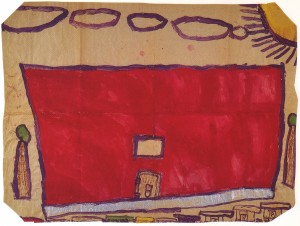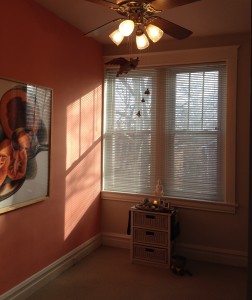Sit Down Wherever You Are
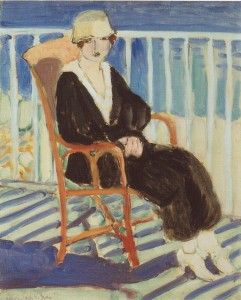 I spent a lovely day today sitting and walking and sitting and walking (and eating) at the home of my friend, Lisa, who lives out in the country, where she not only has a screened-in porch, but also a whole separate screened-in building, (plus a big stone patio, a deck, and several walking paths, etc.) where she hosts a weekly sangha…as well as regular days of silent sitting-and-walking, like the one today.
I spent a lovely day today sitting and walking and sitting and walking (and eating) at the home of my friend, Lisa, who lives out in the country, where she not only has a screened-in porch, but also a whole separate screened-in building, (plus a big stone patio, a deck, and several walking paths, etc.) where she hosts a weekly sangha…as well as regular days of silent sitting-and-walking, like the one today.
We started with a poem:
Forget About Enlightenment
by John Welwood
Sit down wherever you are
And listen to the wind singing in your veins.
Feel the love, the longing, the fear in your bones.
Open your heart to who you are, right now,
Not who you would like to be,
Not the saint you are striving to become,
But the being right here before you, inside you, around you.
All of you is holy.
You are already more and less
Than whatever you can know.
Breathe out,
Touch in,
Let go.
***
Thanks, Lisa!
(image: Young Girl on a Balcony over the Ocean, by Henri Matisse)
Life is Short
 More mindfulness instructions — in yet another form — this time from the founders of Holstee, a sustainable and mindful design company:
More mindfulness instructions — in yet another form — this time from the founders of Holstee, a sustainable and mindful design company:
This is your life. Do what you love, and do it often.
If you don’t like something, change it.
If you don’t like your job, quit.
If you don’t have enough time, stop watching TV.
If you are looking for the love of your life, stop; they will be waiting for you when you start doing things you love.
Stop over analyzing; life is simple.
All emotions are beautiful.
When you eat, appreciate every last bite.
Open your mind, arms, and heart to new things and people; we are united in our differences.
Ask the next person you see what their passion is, and share your inspiring dream with them.
Travel often; getting lost will help you find yourself.
Some opportunities only come once; seize them.
Life is about the people you meet, and the things you create with them, so go out and start creating.
Life is short.
Live your dream and share your passion.
***
(image: Holstee Manifesto, click to enlarge)
How to be Idle and Blessed
And now for a slightly different form of meditation instruction, from Mary Oliver, in her poem The Summer Day:
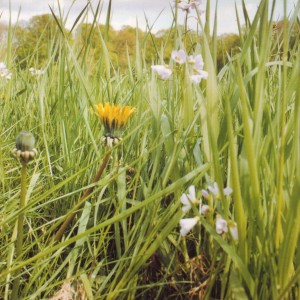 Who made the world?
Who made the world?
Who made the swan, and the black bear?
Who made the grasshopper?
This grasshopper, I mean —
the one who has flung herself out of the grass,
the one who is eating sugar out of my hand,
who is moving her jaws back and forth instead of up and down —
who is gazing around with her enormous and complicated eyes.
Now she lifts her pale forearms and thoroughly washes her face.
Now she snaps her wings open, and floats away.
I don’t know exactly what a prayer is.
I do know how to pay attention, how to fall down
into the grass, how to kneel down in the grass,
how to be idle and blessed, how to stroll through the fields,
which is what I have been doing all day.
Tell me, what else should I have done?
Doesn’t everything die at last, and too soon?
Tell me, what is it you plan to do
with your one wild and precious life?
***
(image from: A Whole World, by Couprie and Louchard)
Always Present
More poetry today, in honor of April (National Poetry Month) and T.S. Eliot, who gave us: “April is the cruelest month…” and to whom something most certainly happened in that Burnt Norton rose garden, although what exactly is unclear — some kind of enlightenment experience, maybe….but certainly it was something, to have resulted in this, his masterpiece work. It opens like this:
Time present and time past
Are both perhaps present in time future,
And time future contained in time past.
If all time is eternally present
All time is unredeemable.
What might have been is an abstraction
Remaining a perpetual possibility
Only in a world of speculation.
What might have been and what has been
Point to one end, which is always present.
Footfalls echo in the memory
Down the passage which we did not take
Towards the door we never opened
Into the rose-garden. My words echo
Thus, in your mind.
But to what purpose
Disturbing the dust on a bowl of rose-leaves
I do not know.
Other echoes
Inhabit the garden. Shall we follow?
Quick, said the bird, find them, find them,
Round the corner. Through the first gate,
Into our first world, shall we follow
The deception of the thrush? Into our first world.
There they were, dignified, invisible,
Moving without pressure, over the dead leaves,
In the autumn heat, through the vibrant air,
And the bird called, in response to
The unheard music hidden in the shrubbery,
And the unseen eye beam crossed, for the roses
Had the look of flowers that are looked at.
There they were as our guests, accepted and accepting.
So we moved, and they, in a formal pattern,
Along the empty alley, into the box circle,
To look down into the drained pool.
Dry the pool, dry concrete, brown edged,
And the pool was filled with water out of sunlight,
And the lotos rose, quietly, quietly,
The surface glittered out of heart of light,
And they were behind us, reflected in the pool.
Then a cloud passed, and the pool was empty.
Go said the bird, for the leaves were full of children,
Hidden excitedly, containing laughter.
Go, go, go, said the bird: human kind
Cannot bear very much reality.
Time past and time future
What might have been and what has been
Point to one end, which is always present.
***
(image by Laura Craig McNellis, from Outsider Art)
Encore
Last night a small meditation group met at my house, in honor which I feel obliged to offer this poem. I’ve posted it before, under similar circumstances, but it bears repeating:
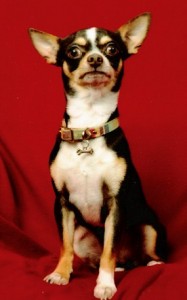 Another Reason Why I Don’t Keep a Gun in the House
Another Reason Why I Don’t Keep a Gun in the House
by Billy Collins
The neighbors’ dog will not stop barking.
He is barking the same high, rhythmic bark
that he barks every time they leave the house.
They must switch him on on their way out.
The neighbor’s dog will not stop barking.
I close all the windows in the house
and I put on a Beethoven symphony full blast
but I can still hear him muffled under the music,
barking, barking, barking,
and now I can see him sitting in the orchestra,
his head raised confidently as if Beethoven
had included a part for barking dog.
When the record finally ends he is still barking,
sitting there in the oboe section barking,
his eyes fixed on the conductor who is
entreating him with his baton
while the other musicians listen in respectful
silence to the famous barking dog solo,
that endless coda that first established
Beethoven as an innovative genius.
Happiness Floats
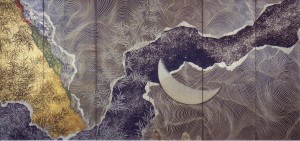 My brother and nephew are visiting from out of town, and I am happy about that. My house didn’t get hit by a tornado last night, and I am happy about that, too. This kind of happiness is based on happy circumstances. Which is lovely…but precarious. There’s another kind of happiness that is not based on happy things happening. It’s an inner, unconditioned happiness, that’s always available (but often obscured), which meditation can help reveal.
My brother and nephew are visiting from out of town, and I am happy about that. My house didn’t get hit by a tornado last night, and I am happy about that, too. This kind of happiness is based on happy circumstances. Which is lovely…but precarious. There’s another kind of happiness that is not based on happy things happening. It’s an inner, unconditioned happiness, that’s always available (but often obscured), which meditation can help reveal.
Here’s a hint of it:
So Much Happiness
by Naomi Shihab Nye
It is difficult to know what to do with so much happiness.
With sadness there is something to rub against,
A wound to tend with lotion and cloth.
When the world falls in around you, you have pieces to pick up,
Something to hold in your hands, like ticket stubs or change.
But happiness floats.
It doesn’t need you to hold it down.
It doesn’t need anything.
Happiness lands on the roof of the next house, singing,
And disappears when it wants to.
You are happy either way.
Even the fact that you once lived in a peaceful tree house
And now live over a quarry of noise and dust
Cannot make you unhappy.
Everything has a life of its own,
It too could wake up filled with possibilities
Of coffee cake and ripe peaches,
And love even the floor which needs to be swept,
The soiled linens and scratched records….
Since there is no place large enough
To contain so much happiness,
You shrug, you raise your hands, and it flows out of you
Into everything you touch. You are not responsible.
You take no credit, as the night sky takes no credit
For the moon, but continues to hold it, and to share it,
And in that way, be known.
***
(image by: Tanabata, by Kayama Matazo; ink, color, gold and silver on silk; St. Louis Art Museum;
click on image to see detail)
What’s Not There
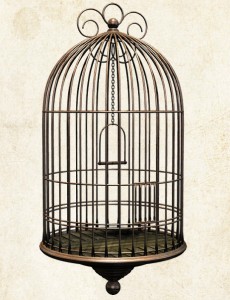 Last night I listened (for the second time) to a wonderful talk by Phillip Moffitt, given at the end of the month-long retreat held this past February at Spirit Rock. The talk is called Liberation Now Leads to Full Liberating Awareness and in it, Phillip uses poetry (as well as examples from his own practice) to convey a sense of what all these teachers/sages/poets are talking about when they use words like “liberation.” (click here to listen to the talk)
Last night I listened (for the second time) to a wonderful talk by Phillip Moffitt, given at the end of the month-long retreat held this past February at Spirit Rock. The talk is called Liberation Now Leads to Full Liberating Awareness and in it, Phillip uses poetry (as well as examples from his own practice) to convey a sense of what all these teachers/sages/poets are talking about when they use words like “liberation.” (click here to listen to the talk)
Here is one of the poems from the talk that really spoke to me. It’s called What’s Not Here, by Rumi.
I start out on this road,
call it love or emptiness,
I only know what’s not here.
Resentment seeds, backscratching greed,
worrying about outcomes, fear of people.
When a bird gets free,
it does not go for remnants left on the bottom of the cage.
Close by, I’m rain. Far off,
a cloud of fire. I seem restless,
but I am deeply at ease.
Branches tremble. The roots are still.
I am a universe in a handful of dirt,
whole when totally demolished.
Talk about choices does not apply to me.
While intelligence considers options,
I am somewhere lost in the wind.
The Best Season
Since today is the first full day of spring, I offer this poem by Wu-Mein:
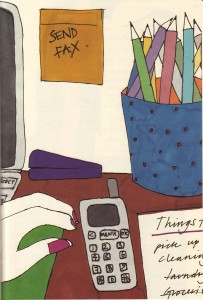 Ten thousand flowers in spring, the moon in autumn,
Ten thousand flowers in spring, the moon in autumn,
a cool breeze in summer, snow in winter.
If your mind isn’t clouded by unnecessary things,
this is the best season of your life.
(illustration from: I Told You So, by Daisy de Villeneuve)
Dropping Keys
There will be a full moon on Sunday, in honor of which I offer this, one of my new favorite poems from Hafiz:
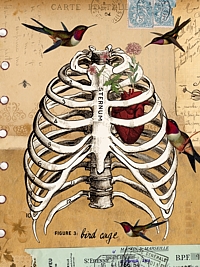 The small man
The small man
builds cages for everyone
he
knows.
While the sage,
who has to duck his head
when the moon in low,
keeps dropping keys all night long
for the
beautiful
rowdy
prisoners.
(image by Alicia Caudle)

